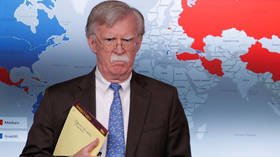Spain, struggling to rebury dictator Franco, hands ultimatum to his family
Spain’s government has clashed with the family of the late fascist dictator, Francisco Franco, over the removal of his remains from a controversial civil war memorial in a move that still seems to be divisive for the Spaniards.
The Spanish Cabinet has given the green light for the exhumation of Franco, who is now buried in the so-called ‘Valley of the Fallen’ – a monumental memorial built under his rule. The move, which the Justice Minister Dolores Delgado praised as “historical”, was met with a stiff opposition by the family and supporters of Franco.
Located north-west of the Spanish capital Madrid, the ‘Valley of the Fallen’ hosts a Catholic basilica and a vast underground crypt built right in the rock, which contains the bodies more than 30,000 people from both sides of the Spanish Civil War that split the country in late 1930s. The memorial, which Franco himself wanted to become an “act of atonement”, has proven to be a source of division within the Spanish society decades after the dictator’s death.
Revered by various right-wing and Francoist groups that still support the late ruler, it also stirs up ill-feelings among some descendants of the Republicans and various left-leaning groups, who see it as a monument to the dictatorial regime rather than a symbol of reconciliation.
The fact that, according to some reports, the forced labor of the Republican prisoners of war and imprisoned opponents of the Francoist regime was used to build the place also only adds fuel to the fire. As Spain seems to be re-opening old sores, the politicians' attempt to resolve controversies around Franco’s resting place, appear to only make things worse.
The Socialist Party, which came to power in June 2018 following a no-confidence vote against the Conservative People’ Party minority government, made the exhumation one of its flagship policies. The government’s decision to remove Franco’s remains from the memorial has been facing fierce opposition from the dictator’s descendants supported by part of the Spanish society.
The bill on the exhumation of Franco’s remains was initially passed by a narrow majority in the Spanish parliament. The legislation was backed by 176 votes with 165 abstentions and two votes against. The move prompted the Franco family to express their “firm and unanimous” opposition to the exhumation.
Now, as the government finally approved the motion, the Cabinet issued an ultimatum to the dictator’s descendants, giving them 15 days to choose a new burial site for the late ruler. If they fail to do so, the decision on the issue will fall to the government.
Franco’s relatives’ however, seem to stand defiant in the face of the government pressure as they announced that would challenge the Cabinet’s decision in the Supreme Court. Earlier, Luis Alfonso de Borbon, the family's most outspoken defender of his great-grandfather's legacy, repeatedly criticized the move.
"When you attack Franco, you attack my family, over half of Spain, the monarchy and the Church which protected him," he told local media in October 2018. "History will condemn those who profane this grandiose temple," he also once wrote on Instagram, referring to the ‘Valley of the Fallen’ basilica, where Franco has been buried in 1975.
Spanish dictator Francisco Franco may soon have a new resting place https://t.co/KAqOdHWMi0
— RT (@RT_com) 13 мая 2017 г.
Earlier, the family demanded the body of the dictator be reburied in La Almudena cathedral, a landmark tourist attraction and the seat of the Roman Catholic Archdiocese of Madrid, located in the center of the Spanish capital right near the Royal Palace. In response, the government said it could not let this happen for of public safety reasons.
Now, the potential exhumation, which Spain’s National Heritage Trust, the state agency managing state and royal properties, described as a “minor” body of work costing less than €3,800 (under $4,300), might yet emerge as another point of contention in Spain’s tumultuous politics, which is still feeling the aftershocks of Catalonia’s secession bid.
The Spanish authorities have repeatedly sought to remove Franco’s remains from the ‘Valley of the Fallen’. In May 2017, the Spanish lawmakers already passed a similar motion. An earlier attempt in February of the same year was blocked by the Spanish Supreme Court.
Now, the Socialist government of Prime Minister Pedro Sanchez has to act fast as the Cabinet itself has also scheduled a snap parliament election to take place in late April.
Also on rt.com Spanish parliament rejects Socialist government's budget, paving way for possible early electionsIf you like this story, share it with a friend!













